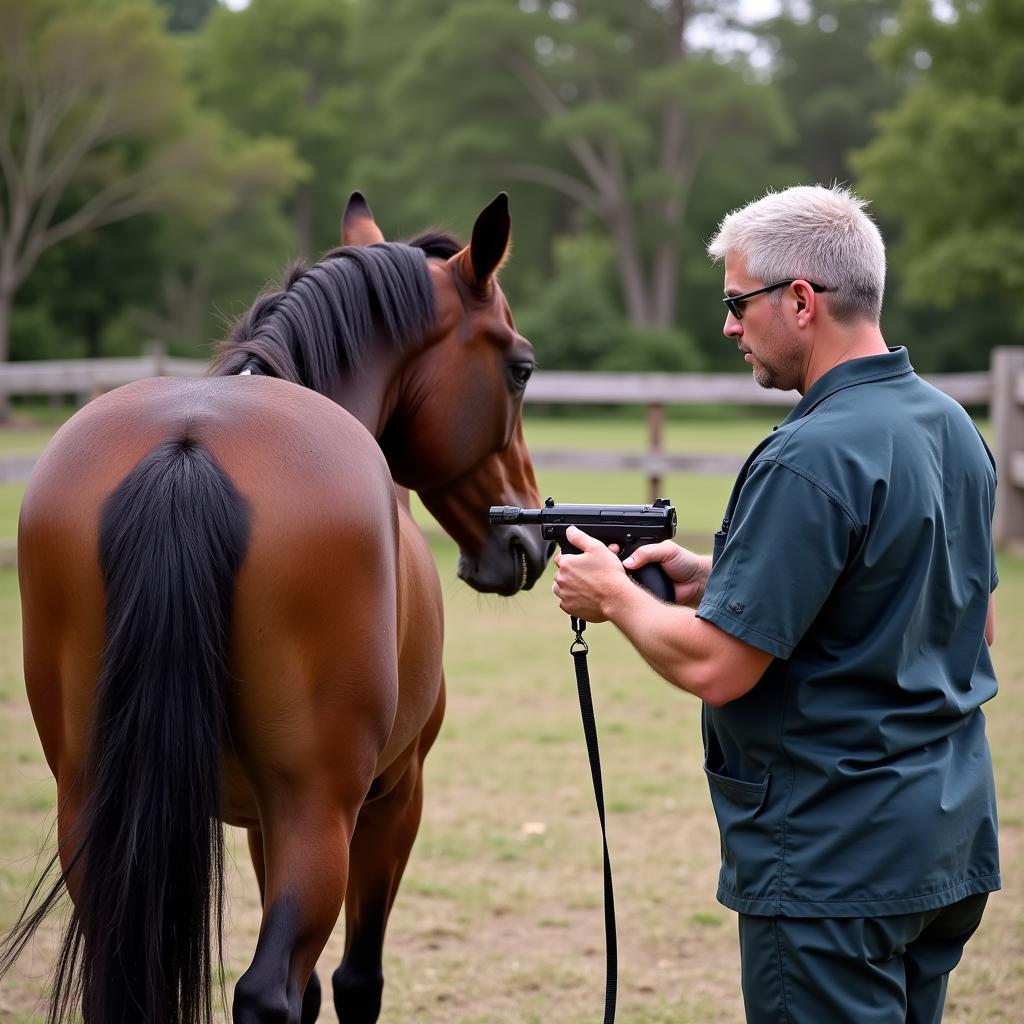A Horse Tranquilizer Gun is a crucial tool for veterinarians and experienced equine handlers. It allows for the safe and controlled administration of sedatives or other medications, ensuring both the horse’s and handler’s well-being during necessary procedures. Understanding its use, implications, and alternatives is vital for responsible horse ownership and care.
When is a Horse Tranquilizer Gun Necessary?
Several situations may necessitate the use of a horse tranquilizer gun. These include:
- Minor surgical procedures: For procedures like wound stitching or dental work, a tranquilizer gun can ensure the horse remains still and comfortable.
- Emergency situations: In cases of injury or distress, a tranquilizer gun can quickly calm a horse, making it safer to transport or treat.
- Handling aggressive or fearful horses: For particularly challenging horses, sedation can make routine procedures like vaccinations or hoof trimming less stressful.
- Transport: Long journeys or stressful transportation situations may require sedation to minimize the horse’s anxiety.
 Veterinarian using a horse tranquilizer gun
Veterinarian using a horse tranquilizer gun
Choosing the Right Sedative for Your Horse
Selecting the appropriate sedative is crucial for the horse’s safety and the effectiveness of the procedure. Factors like the horse’s age, weight, health condition, and the intended procedure all play a role. Commonly used sedatives include:
- Acepromazine: This is a popular choice for its calming and anxiety-reducing effects.
- Xylazine: Often used in combination with other sedatives for more potent sedation.
- Detomidine: Provides good muscle relaxation and analgesia.
- Butorphanol: Primarily used for pain relief but can also have sedative properties.
Alternatives to a Horse Tranquilizer Gun
While a tranquilizer gun can be invaluable, exploring alternative methods of calming a horse is always beneficial. These include:
- Training and desensitization: Building a trusting relationship with your horse and gradually exposing it to potentially stressful situations can reduce the need for chemical sedation.
- Herbal calming supplements: Several natural supplements can help reduce anxiety in horses, though their effectiveness varies.
- Aromatherapy: Certain essential oils, like lavender, have calming properties and can help create a more relaxing environment.
- Acupressure: Applying pressure to specific points on the horse’s body can have a calming effect.
“Building trust through consistent training and handling is the best long-term strategy for managing a horse’s anxiety,” says Dr. Emily Carter, DVM, an equine veterinarian with over 20 years of experience.
Risks and Side Effects of Horse Tranquilizers
While generally safe when used correctly, horse tranquilizers can have potential side effects. These can include:
- Ataxia (loss of coordination): This is a common side effect and requires careful monitoring to prevent injury.
- Respiratory depression: Certain sedatives can slow breathing, requiring close observation.
- Cardiovascular effects: Changes in heart rate and blood pressure can occur.
- Paradoxical reactions: In rare cases, a horse may exhibit an opposite reaction to the sedative, becoming agitated or aggressive.
“Always consult with a veterinarian to determine the appropriate sedative and dosage for your horse,” advises Dr. Mark Johnson, an equine specialist with Justus Horses USA. “They can assess your horse’s individual needs and minimize the risk of complications.”
Conclusion
The horse tranquilizer gun is a powerful tool for managing horses in various situations, from routine procedures to emergencies. However, responsible use requires a thorough understanding of the different sedatives, their effects, and potential risks. Prioritizing training, desensitization, and alternative calming methods can minimize the need for chemical sedation. Consulting with a qualified veterinarian is crucial for determining the appropriate course of action for your horse’s individual needs, ensuring both safety and well-being. Using a horse tranquilizer gun effectively and responsibly is a key aspect of providing optimal care for your equine companion.
FAQ
- How long does a horse tranquilizer last? The duration varies depending on the specific sedative used, typically ranging from 30 minutes to several hours.
- Can I administer a horse tranquilizer myself? It is strongly recommended that only trained professionals, such as veterinarians, administer tranquilizers.
- Are there any natural alternatives to tranquilizers? Yes, options like training, herbal supplements, and aromatherapy can help calm horses.
- What are the risks of using a horse tranquilizer gun? Potential side effects include ataxia, respiratory depression, and cardiovascular changes.
- How do I choose the right sedative for my horse? A veterinarian can assess your horse’s needs and recommend the most appropriate sedative and dosage.
- What precautions should I take when using a horse tranquilizer gun? Ensure proper training, maintain a safe distance, and have a clear plan for handling the sedated horse.
- What should I do if my horse has an adverse reaction to a tranquilizer? Contact your veterinarian immediately.
You might also be interested in our articles on “Horse Health and Wellness” and “Equine First Aid”.
Need assistance? Contact us at Phone: 0772127271, Email: [email protected] or visit us at QGM2+WX2, Vị Trung, Vị Thuỷ, Hậu Giang, Việt Nam. Our customer service team is available 24/7.